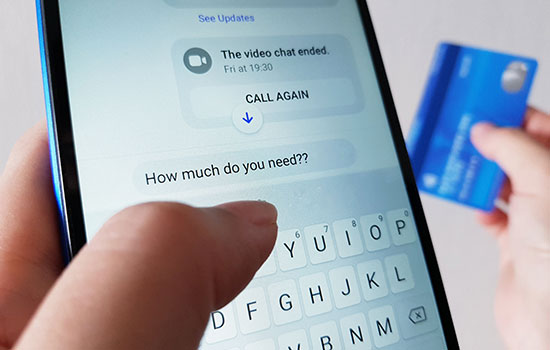
We often talk about the best ways to protect yourself against scams of all kinds, whether it be in your personal life or at work. However, it’s also important to be aware of a few of the more common techniques a fraudster will use to contact you, so you can be better prepared if a situation presents itself. Some recent scams we have seen are:
A text message or phone call pretending to be your bank or credit union asking for confidential information
This is a type of account takeover fraud. Tricksters will reach out via text or call, asking you to take action for some reason. They will seem authentic and might even have information like your card number or address. They’ll ask you to give them additional information, such as your PIN, password or other sensitive data, and they will urge you to act quickly. Always confirm who the caller is by hanging up, calling your financial institution’s official phone number and confirming any information the scammer gave you. More often than not, you’ll discover it was a scam. Your financial institution can then help you re-secure your accounts.
Social media tricks including fake influencers, romance fraud, job scams or “free money” cons
Social media is the perfect place to take advantage of an unsuspecting person – swindlers can hide behind a screen and keyboard. If you see an ad by an “influencer” that seems too good to be true, it most likely is. People also use romantic cons to steal money or information from someone looking for love. If you meet someone online, don’t ever send them money. Even looking for a job online isn’t always safe – be careful where you apply for open positions. Use known companies like Indeed or ZipRecruiter. Or better yet, find the job listing on a company’s actual website and apply there. Finally, if you get a direct message on a social media channel that tells you that you won a giveaway for a million dollars and all you have to do is send a check for $10,000 to cover the taxes, report it to the police and don’t send any money – it’s definitely too good to be true.
Email phishing schemes, like a fake Amazon or Paypal charge email, as well as virus software renewal scams
Email is one of the most popular ways scammers contact you. If you get an email from a company like Amazon or Paypal but you haven’t ordered from Amazon lately, and don’t use Paypal, don’t open the email! If you’re not expecting a message from that company, it could be a scam. If you’re concerned, always reach out to the company directly via their official communication channels and ask about any of the problems in question. In an email situation, you can also check the sender’s email address. If the sender is supposed to be from Amazon but comes from totallyrealamazn@packajenotifya11day.com, trust your gut – it’s not real.
If you receive communication claiming to be from Solarity and it doesn’t feel right, please reach out. We’re happy to help you decipher if something is legit or not. And remember – Solarity will NEVER send messages asking for sensitive account information.
What's your Solarity story?
We're on a mission to tell the stories of our members and how they are living their best lives. Do you have a Solarity story to share?



